
Florida is among those states where where families can participate in private school choice programs at schools such as The Willow School in Vero Beach, where 75% of the students use some form of state-supported school choice scholarship. The result is more diversity than most schools in the region, public or private.
Editor’s note: In this commentary, American Federation for Children chairman Bill Oberndorf explains a state-based strategy for advancing school choice in an interview with Education Next senior editor Paul Peterson. The interview first appeared on the Education Next website.
Paul Peterson: Why did you decide to focus much of your philanthropy on helping disadvantaged children attend private school?
Bill Oberndorf: I felt extremely fortunate that I was able to attend a wonderful private school in Cleveland, and only because my grandparents set aside and saved money for the education of my brothers and me. I felt that every kid who wants to work hard in school, whose parents want something better for them, should have access to the kind of education that best fits the needs of that child. I feel that this is the civil-rights issue of our time.
Peterson: The idea of private-school choice through government-funded vouchers was proposed by Milton Friedman in the 1950s. Seventy years later, we have only a few such programs in this country. Why has it been so difficult to build public support for this idea?
Oberndorf: I remember talking to Milton Friedman about this shortly before he died. He said, “Well, we’re just about right on schedule. It takes decades for ideas to take root before they really can flourish.” So Milton was not deterred. The opposition has come from the teachers unions, which are such a powerful force and funding source for the Democratic Party that this has created major obstacles along the way. But the good news is that now there are private-school choice programs in 22 states. And 45 states plus D.C. have charter-school programs.
Peterson: Yes, but in recent years it seemed like progress was stalling out. In 2016 in Massachusetts, for example, a ballot initiative to expand charter schools was defeated, even though charter schools in Massachusetts seemed to be doing very well. There were also divisions within the school-choice movement, and the energy seemed to be disappearing. How were you assessing the state of school choice at that time?
Oberndorf: The charter-school movement had scaled up to around 3 million students enrolled, and suddenly, for the first time, that sector was feeling the kind of union opposition that the private-school choice movement had felt all along. This did create a lull, but since then, some important things have happened that have helped change the overall trajectory of the advocacy and implementation of private-school and charter-school choice.
To continue reading, click here.
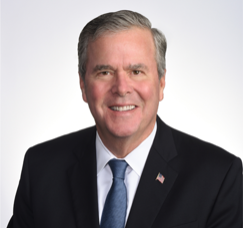
Earlier this week, former Florida Gov. Jeb Bush joined Education Next editor-in-chief Marty West to talk about the lessons he learned dealing with crisis and how those lessons can be applied to the coronavirus pandemic and the challenges it poses for K-12 education.
Among the suggestions Bush offers state and national leaders: Be clear and transparent, connect on a human level, and gather the best possible minds regardless of political persuasion.
“Just as in every disaster or every disruptive time in world history, incredible things happen when you’re forced to do things,” Bush says. “Because you have no other option, generally, you do them.”
Listen to the podcast at https://www.educationnext.org/ednext-podcast-jeb-bush-on-adjusting-to-distance-learning-during-pandemic-covid-19-coronavirus/.
Ever since Donald Trump became president, opponents of school choice have tried to tie charter schools, vouchers and scholarship tax credits to the polarizing politician.
A new public opinion survey suggests those tactics might not be working as intended.
Survey researchers with Education Next asked questions about two school choice policies two ways. Half the respondents answered basic questions about whether they supported tax credit scholarships or charter schools. The other half were asked the same questions, after being told Trump supports the policies.
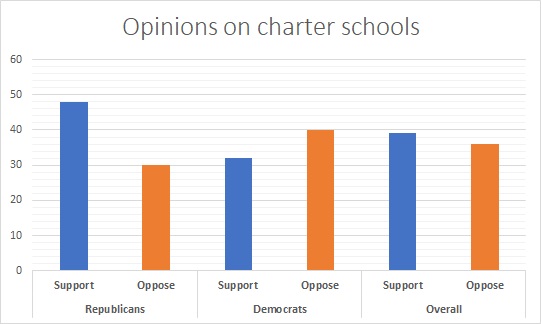
Even after a sharp drop, charter school supporters still outnumber opponents, according to the latest Ed Next poll.
Associating the policies with Trump didn't change overall support for either policy. But it did tend to polarize issues. Support among Democrats went down, while support among Republicans went up.
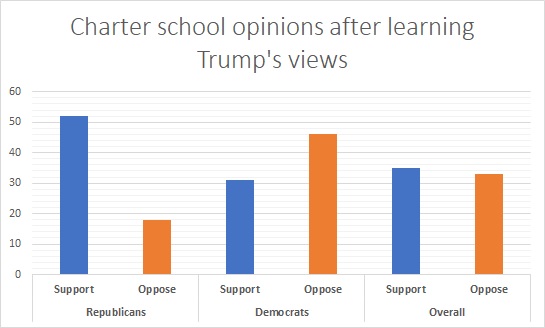
Hearing about President Trump's views doesn't change overall charter school support. But it widens the partisan divide.
The poll confirms something school choice advocates saw on the ground during last year's elections. (more…)
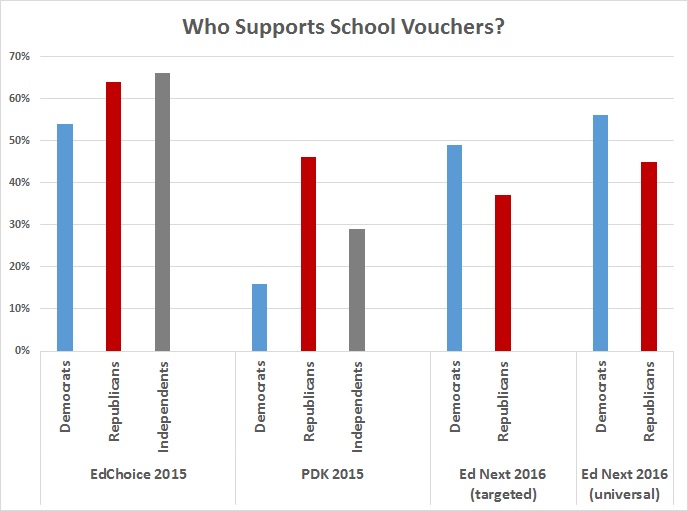
Who supports vouchers? Depends who's asking, and how.
This week, PDK International released its annual survey of public opinion on schools. Its results shed little light on this question, since it now delves much more deeply into big-picture questions about the purpose of American schooling, but avoids questions about charter schools, vouchers, or parental choice in education. As a result, we have to dig in to other recent polls.
Last year, EdChoice, nee the Friedman Foundation, found stronger support for vouchers than Ed Next. It also found support for vouchers was stronger among Republicans (64 percent) than among Democrats (54 percent). Among independents, it was strongest of all (66 percent). That survey asked the question this way:
A school voucher system allows parents the option of sending their child to the school of their choice, whether that school is public or private, including both religious and non-religious schools. If this policy were adopted, tax dollars currently allocated to a school district would be allocated to parents in the form of a “school voucher” to pay partial or full tuition for their child’s school. In general, do you favor or oppose a school voucher system?
Republicans are often the strongest backers of school vouchers in Congress and state legislatures, but among rank-and-file partisans, private school choice may actually enjoy greater backing from Democrats.
That's one of the more surprising findings from the latest wide-ranging public opinion survey by the school reform journal Education Next.
The poll finds support for private school vouchers may be slipping, but support for tax credit scholarships and charter schools holds steady despite recent controversies. The annual survey's large sample means subtle trend lines and relatively small gaps can still be meaningful. This year's version has a margin of error of roughly 1.5 percent.
Tax credit scholarships remain the most popular form of private school choice. They garner the support of 57 percent of Democrats surveyed, as well as a 49-percent plurality of Republicans.
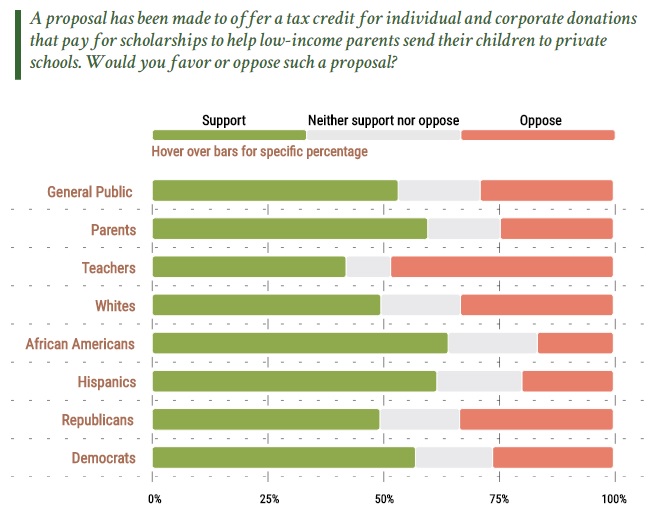
Chart via Ed Next.

Black, white, Hispanic; Republicans, Democrats. All support public-school choice, according to a new poll. Full results here.
Earlier this year, the Florida Legislature pursued an expansion of public school choice, but the effort fell apart in the waning days of the legislative session.
A new national survey suggests the public strongly supports such a concept.
Nearly two-thirds of parents surveyed by Phi Delta Kappan and Gallup said they support allowing people to choose the schools their children attend "regardless of where they live." Support crosses different political and racial lines, though blacks and Republicans are slightly more supportive than whites and Democrats.
Of course, polls like this should be read with caution. For one thing, it's a national survey, and lots of education policy is set at the state or local level. (more…)
 A new survey from Education Next suggests conservatives interested in expanding school choice may be shooting themselves in the foot by opposing Common Core.
A new survey from Education Next suggests conservatives interested in expanding school choice may be shooting themselves in the foot by opposing Common Core.
The reason? According to the survey results, Americans become more favorable to school choice (and other education reforms) when they are better informed about the relative achievement of students at local schools.
Released Tuesday, the survey by researchers Michael B. Henderson, William G. Howell and Paul E. Peterson divides respondents into two groups – the informed and the uninformed. It then asks questions related to how the public feels about local schools, teachers, teacher unions, standardized testing and school choice. Informed responders were made aware, by the authors, of how well local students performed relative to their peers statewide or nationally.
Consistent with other surveys, the public held fairly high opinions of their local schools but low opinions of all other schools. Opinions of local school performance fell when the public was made aware of local student achievement. Informed Americans did not change their already favorable opinion on testing and standards in general, but did have an increased preference for high-stakes testing tied to third-grade promotion and high school graduation.
In regards to school choice, Americans actually become less supportive of “targeted vouchers” (vouchers for low-income students) and more supportive of “universal vouchers” (voucher for all) when informed of relative student achievement. Residents living in below-average school districts were significantly more supportive of universal vouchers.
With more information about how local students perform relative to their peers, Americans do appear to become more supportive of school choice and other policies supported by the education reform community. It is entirely possible that Common Core could make Americans more informed about student achievement. As the authors’ note, “there is a certain irony in the fact that CCSS’s opponents favor many of the reforms that seem primed for winning greater public approval should the standards be fully implemented.”
However, not all opponents of Common Core are in the ed reform camp. I don’t expect the teacher unions and their supporters to jump with excitement at this survey’s findings. Read the full survey here.
Nothing gets critics of school choice and education reform more riled up than the specter of privatization. The response from Rick Hess: It’s complicated. For-profits in education can bring problems, he says. But they can also be a big help.
Hess, director of education policy studies at the American Enterprise Institute, is co-editor (along with Michael B. Horn of the Christensen Institute) of a new book on the subject, “Private Enterprise and Public Education.” He’ll be our guest next week, in a live chat, to talk about it.
“Of course, the record of private ventures in education, as in other sectors, is mixed. It’s no wiser to romanticize for-profit providers than to demonize them,” says the book’s introduction. But, it continues, “For-profit enterprises have brought innovative power to an array of sectors. Given sensible policies and quality-control mechanisms, the particular strengths of for-profits can make them an invaluable part of the education tapestry.”
The chat isn’t limited to the book. Among many other hats, Hess is executive editor of EducationNext and author of the “Straight Up” blog at Education Week. He frequently weighs in on a wide range of ed topics, and doesn’t fit neatly into anybody’s ed reform box. So, ask away.
It’ll help to send some questions in advance. You can post them here, or on the redefinED facebook page, or tweet them to us @redefinedonline.
To participate in the chat, just come back to the blog on Monday, Sept. 9 at 1:30 p.m. You’ll have a full hour to ask away.
Editor’s note: For years, there have been concerns about discordant trend lines for students in many states – rising, according to the state’s own standardized tests, but anemic according to the National Assessment of Educational Progress. In Florida (where we’re based), the lines tend to be in sync. But this post scrutinizes a state where that isn’t the case.
by Alan Bonsteel
The California Department of Education (CDE) just announced it must delay the release of its annual STAR testing results because at least some of the test questions were posted on Internet sites such as Twitter and Facebook. Way back in April, CDE found about 1600 images on the Internet, though many were only of test booklets and student answer sheets rather than actual questions. After investigating, CDE traced the images to 12 schools around the state. It’s now trying to analyze how much damage the leaked questions, at least 36 to date, have caused so it can accurately report scores.
Almost all states do their own testing of their public school students, an obvious conflict of interest that almost always results in unrealistically rosy test results. Tests tied to inherently weak standards that states have been allowed to adopt produce test results that do not correlate with what students actually need to know. Here in California, the STAR has made up nearly all of the misnamed “Academic Performance Index" since 1999. Although the high school exit exam has been added, the addition of graduation and dropout data, called for in the legislation more than a decade ago, has yet again been delayed until next year.
From the outset the STAR results soared, at least in part due to lax security, a failure to change or even rotate questions from year to year, and consequently, some teaching to the actual questions on the test. By contrast, the two other standardized tests given throughout the United States, the NAEP, or National Assessment of Educational Progress, and the SAT, have remained generally flat, showing only very modest improvements over more than a decade in each case. Both of these latter two tests are given by independent testing authorities, and security has been maintained with them.
California is not the worst when NAEP scores are analyzed; Iowa, Maine, and Oklahoma have grabbed that honor. Thanks to Education Next, you can find a map with results from 41 states here. California edged itself just above the median.
For years our group, California Parents for Educational Choice, has commented in the news media about the disconnect between the self-administered STAR and the two objective exams, with telling results. (more…)
Editor's note: Here's another selection of "choice nuggets," a feature we started last week to keep some smaller but still blogworthy items from going to the compost heap. 
Are vouchers too popular, or not popular enough?
For years, school choice critics have posited that vouchers and tax-credit scholarships will open the floodgates for a mass exodus from public schools. So it was a bit of a monkey shock last week to read Diane Ravitch belittling Louisiana’s new voucher program because, in her view, too few students had applied.
“Not exactly a stampede for the exits,” Ravitch wrote. “No big rush to enroll in the little church schools that are supposedly better than the public schools … ”
According to published reports, about 9,000 students applied for vouchers, not counting those already enrolled in the voucher program in New Orleans. Sounds like a lot of people to me. But if it’s obvious that only a small percentage of parents will opt for private schools (because, truth be told, most parents are satisfied with their public schools) then why are critics so upset? Doesn’t that undermine the argument that school choice is a Trojan Horse for profiteers?
Ravitch ends her piece by suggesting Louisiana officials puffed up the application numbers. “As usual,” she concluded, “they were playing the media for headlines.”
Two days later, the Washington Post’s “Answer Sheet” blog ran Ravitch’s piece in full.
A tale of two reports
Two national reports released in the last week purported to offer some gauge of academic progress in Florida’s public schools. One relied on apparently undisclosed measures to determine that Florida’s educational ranking dropped from No. 35 to No. 42 in the past year. The other tracked nearly 20 years of scores from the National Assessment of Educational Progress to conclude that Florida students have made more progress than their peers in every state but one.
Guess which report got more play? (more…)